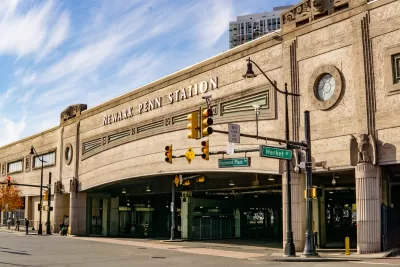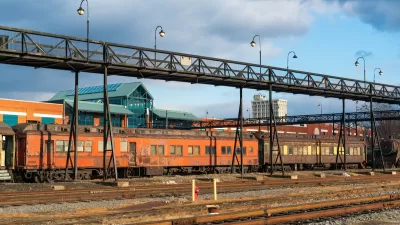The project is primarily funded through federal agencies and will improve a key link between New Jersey and New York City.

The $16 billion Gateway Tunnel project under the Hudson River celebrated the last key piece of funding in the form of a $6.88 billion federal check, reports Colleen Wilson for NorthJersey.com, putting the project ‘past the point of no return.’ Roughly 70 percent of the project is funded through federal dollars.
“Federal, state and local transportation officials came together on a blistering, humid Monday morning to celebrate the occasion of awarding the largest federal grant in U.S. Department of Transportation history for what many have dubbed the most urgent infrastructure project in the country.” The new, two-track rail tunnel will complement repairs to the existing rail tunnel that links Newark, New Jersey to New York City, which suffered damages in Hurricane Sandy that frequently disrupt rail service.
Wilson notes that “While construction has already begun and additional bids are expected to be awarded later this year, the new tunnel is are not expected to be completed until 2035, and the renovation of the older tunnel won't be finished until 2038.”
FULL STORY: Gateway rail tunnel reaches 'point of no return' with $6.9 billion check

Maui's Vacation Rental Debate Turns Ugly
Verbal attacks, misinformation campaigns and fistfights plague a high-stakes debate to convert thousands of vacation rentals into long-term housing.

Planetizen Federal Action Tracker
A weekly monitor of how Trump’s orders and actions are impacting planners and planning in America.

In Urban Planning, AI Prompting Could be the New Design Thinking
Creativity has long been key to great urban design. What if we see AI as our new creative partner?

King County Supportive Housing Program Offers Hope for Unhoused Residents
The county is taking a ‘Housing First’ approach that prioritizes getting people into housing, then offering wraparound supportive services.

Researchers Use AI to Get Clearer Picture of US Housing
Analysts are using artificial intelligence to supercharge their research by allowing them to comb through data faster. Though these AI tools can be error prone, they save time and housing researchers are optimistic about the future.

Making Shared Micromobility More Inclusive
Cities and shared mobility system operators can do more to include people with disabilities in planning and operations, per a new report.
Urban Design for Planners 1: Software Tools
This six-course series explores essential urban design concepts using open source software and equips planners with the tools they need to participate fully in the urban design process.
Planning for Universal Design
Learn the tools for implementing Universal Design in planning regulations.
planning NEXT
Appalachian Highlands Housing Partners
Mpact (founded as Rail~Volution)
City of Camden Redevelopment Agency
City of Astoria
City of Portland
City of Laramie





























